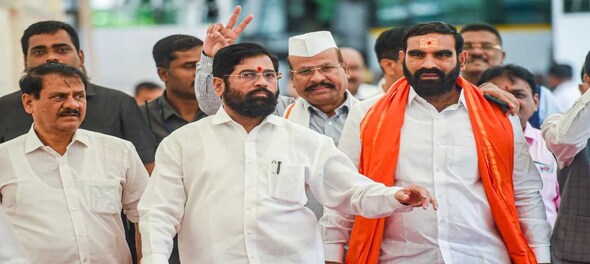
The Maharashtra Assembly on Tuesday passed the Maratha Reservation Bill, granting a 10% reservation for the Maratha community in both education and government jobs. Manoj Jarange, a Maratha activist, had been on hunger strike since February 10 asking the state government to hold a session to address the community's demands.
Maharashtra Chief Minister Eknath Shinde on Tuesday tabled a bill -- Maharashtra State Socially and Educationally Backward Bill 2024 -- in the state assembly, proposing 10% reservation to the Maratha community in education and government jobs.
विधीमंडळ विशेष अधिवेशन | विधान परिषद 🗓️ 20-02-2024📍मुंबईhttps://t.co/virCf34Nx7
— Eknath Shinde - एकनाथ शिंदे (@mieknathshinde) February 20, 2024
The Bill further proposed that after the reservation comes into effect, a review can be done after 10 years. It underscored that the population of the Maratha community in the state is 28%.
This comes days after the Maharashtra State Backward Class Commission on February 16 submitted its report regarding a survey on the social, economic, and educational backwardness of the Maratha community.
In a statement, the CMO said that the report will enable the state government to introduce a law to ensure reservation to the people belonging to the Maratha community with the backing of necessary data. The survey covered around 2.5 crore families across the state.
The Maharashtra Chief Minister has said that the Maratha community shall be given a reservation without disturbing the existing quota of other communities.
The backward class panel's survey started on January 23 across the state and involved 3.5 to 4 lakh state government personnel. The state government, in a parallel exercise, had also looked up Kunbi records. Kunbi, which is an agrarian community, falls under the Other Backward Classes (OBC) category. Besides other demands, Manoj Jarange has been asking for Kunbi certificates for all Marathas.
Here's a brief timeline of the matter:
1980: In 1981, the state witnessed its first protests demanding reservation for Marathas under the leadership of Mathadi Labour Union leader Annasaheb Patil, according to reports.
1997: The first major Maratha agitation for reservation educational institutions and government jobs was witnessed in the year 1997. It was spearheaded by the Maratha Mahasangh and the Maratha Seva Sangh.
2008-2013: Several politicians, including former Chief Ministers Sharad Pawar and Vilasrao Deshmukh, extended support to the demand. Multiple political parties also supported the demand for reservation to the people belonging to the Maratha community.
June 2014: Prithviraj Chavan-led Congress-Nationalist Congress Party government approved a proposal to reserve 16% of seats in government jobs and educational institutions for the Marathas and 5% for Muslims.
November 2014: The Bombay High Court stayed the previous Congress-NCP government's decision, while the new BJP-Shiv Sena-led government decided to move Supreme Court.
December 2014: The Supreme Court refused to vacate the Bombay High Court's interim order regarding stay on reservation for the Maratha community in Maharashtra.
August 2016: First Maratha Kranti morcha was held in Aurangabad as the Kopardi rape and murder of a 15-year-old girl rocked the entire state.
December 2016: Maharashtra government files affidavit in support of its stand on reservation for the Maratha community.
June 2017: The then Devendra Fadnavis-led government constituted the Maharashtra State Backward Class Commission (MSBCC) to study the social, financial, and educational status of the Maratha community. the commission was headed by Justice (retired) MG Gaikwad.
August 2017: Maratha Kranti Morcha carried out one of its biggest protests in Mumbai. As per reports, around half a million members of the Maratha community participated in the protest.
November 2018: The Commission submitted its report and classified Marathas as a socially and educationally backward class (SEBC). Later, the Maharashtra Assembly legislature passed a bill proposing a 16% reservation in education and government jobs for the people belonging to the Maratha community.
December 2018: Multiple petitions filed in the Bombay High Court challenging the state government's quota decision, terming it as violative of the Supreme Court orders. However, the High Court refused to grant an interim stay on the quota decision.
January-February 2019: Maharashtra government files affidavit, standing by its decision to grant reservation to the Maratha community. Following this, a division bench of Justices Ranjit More and Bharati Dangre commenced the final hearing in the case.
June 2019: Bombay High Court upholds the constitutional validity of the Maratha quota under the Socially and Educationally Backward Classes (SEBC) Act, 2018. However, the high court noted that the 16% quota was not ‘justifiable,’ and reduced it to 12% in education and 13% in government jobs, as recommended by the State Backward Class Commission.
September 2020: The Supreme Court refers the matter to a larger bench on whether the state government has the power to declare a class socially and economically backward.
May 2021: A five-judge Constitution bench of the Supreme Court struck down the provisions of the law by the Maharashtra government providing reservation to the Maratha community, over the 50% ceiling limit.
April 2023: Supreme Court dismisses a plea for review by the Maharashtra government against the May 5, 2021 judgement.
December 2023: The apex court decides to hear the curative petition filed by the Maharashtra government on the Maratha reservation.
(Edited by : Sudarsanan Mani)
First Published: Feb 20, 2024 2:56 PM IST
Check out our in-depth Market Coverage, Business News & get real-time Stock Market Updates on CNBC-TV18. Also, Watch our channels CNBC-TV18, CNBC Awaaz and CNBC Bajar Live on-the-go!


BJP's Hindi heartland dominance faces test in phase 3 polls
May 2, 2024 9:14 PM
Lok Sabha Election: Re-elections at a Ajmer booth after presiding officer misplaces register of voters
May 2, 2024 4:54 PM

